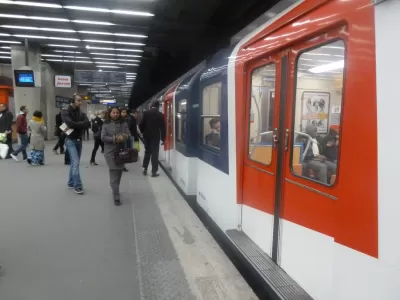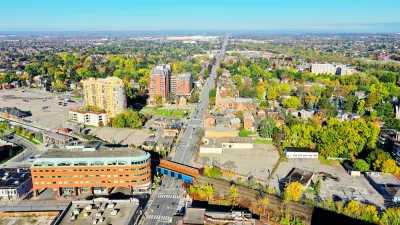The common refrain is that transit is just better in other countries. However, the reasons why are more complex than initial impressions allow, providing important lessons for the United States.

Jonathan English takes a closer look at how transit systems have evolved in Canada and throughout Europe to better understand why transit in the United States lacks in comparison. In short, policy and planning decisions that foster robust service are the key, says English:
Sustaining higher gas prices won’t single-handedly save transit systems, as advocates sometimes wishfully hope. European countries show that, while pricier fuel may drive some people to transit, it doesn’t make a meaningful difference if service isn't improved first.
Both the United States and Europe embraced the automobile after World War II and built the roadway infrastructure to support it. However, says English, in the suburbs of European cities transit remained a priority and train and rail stations were the anchors of new neighborhoods.
In addition, European cities continued to build rail even while developing highway networks, and the extensive commuter rail and bus networks throughout Europe today make transit travel much more feasible. English also says that equitable fare models are important to make transit an accessible and attractive mode of travel.
He says that planners in the U.S. need to look at the possibilities for improving transit, particularly for the suburbs. “All too often, transit planners—and even advocates—find themselves resigned to fatalism about the prospect of transit in American suburbs. They’re convinced that these spread-out and car-centric spaces are fundamentally irreconcilable with public transportation,” says English.
Toronto is an example, says English, of a city similar in variety of ways to many American cities, with an expanse of suburbs and highways. However, bus service connects these suburbs to the subway system. As a result, transit use is much higher and subsidies for transit are much lower than in comparable American cities.
“In some ways, the story of American transit is not so unique. Europeans and Canadians also like to drive. Their countries have also built big expressway networks. The difference is more basic, yet profound: When transit service isn’t good, few will choose to use it,” concludes English.
FULL STORY: Why Public Transportation Works Better Outside the U.S.

Planetizen Federal Action Tracker
A weekly monitor of how Trump’s orders and actions are impacting planners and planning in America.

Maui's Vacation Rental Debate Turns Ugly
Verbal attacks, misinformation campaigns and fistfights plague a high-stakes debate to convert thousands of vacation rentals into long-term housing.

Restaurant Patios Were a Pandemic Win — Why Were They so Hard to Keep?
Social distancing requirements and changes in travel patterns prompted cities to pilot new uses for street and sidewalk space. Then it got complicated.

In California Battle of Housing vs. Environment, Housing Just Won
A new state law significantly limits the power of CEQA, an environmental review law that served as a powerful tool for blocking new development.

Boulder Eliminates Parking Minimums Citywide
Officials estimate the cost of building a single underground parking space at up to $100,000.

Orange County, Florida Adopts Largest US “Sprawl Repair” Code
The ‘Orange Code’ seeks to rectify decades of sprawl-inducing, car-oriented development.
Urban Design for Planners 1: Software Tools
This six-course series explores essential urban design concepts using open source software and equips planners with the tools they need to participate fully in the urban design process.
Planning for Universal Design
Learn the tools for implementing Universal Design in planning regulations.
Heyer Gruel & Associates PA
JM Goldson LLC
Custer County Colorado
City of Camden Redevelopment Agency
City of Astoria
Transportation Research & Education Center (TREC) at Portland State University
Jefferson Parish Government
Camden Redevelopment Agency
City of Claremont





























